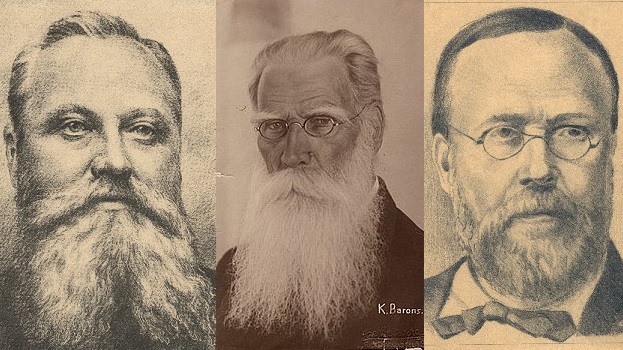Latvian national awakening was a period of 1860-1918 was the period when long-oppressed Latvians reasserted and began to respect their own language and culture.
Latvian national awakening wouldn’t have come into fruition if not its enigmatic leaders, each of whom helped define a particular part of the Latvian nation.
Three most famous Latvian National Awakening heroes:

Andrejs Pumpurs (1841-1902) was the author of Latvia’s national heroic epic Lāčplēsis (Bear Slayer, 1888) to whom he attributed various mythological stories. Lāčplēsis is described as an ethnic Latvian who fought against Vikings a Millennium ago, but he effectively became a kind of personification of Latvia, a reminder of the last era (before 20th century) when Latvians still enjoyed and defended their freedom. Many patriotic and pro-independence organizations were later named after Lāčplēsis; “Lāčplēsis Day” is an annual patriotic holiday.
Krišjānis Barons (1835-1923) was a collector of Latvian folk songs. His lifetime Project was huge, involved research all around Latvia. The resulting “cabinet of songs” of over 200 000 folksongs was inscribed into UNESCO “Memory of the world”. Latvian songs would later greatly influence Latvian independence movements, forming the basis of regular Song festivals. If not for Barons’s work, many of these folksongs would likely have been forgotten, as Latvia was undergoing swift urbanization; that way Latvians would not have a key pillar of their identity.
Krišjānis Valdemārs (1825-1891) was the force behind Latvian naval movement, inspiring creation of many naval schools along the Latvian coast. The mariners they prepared effectively Latvianised the crews of Latvia-stationed merchant fleets that were previously non-Latvian. Shipbuilding was also initiated. Valdemārs’s main symbollic addition to the rising Young Latvian movement was however his Luther-like thesis of public declaration at his home that claimed that Valdemārs is a Latvian. Before that all educated Latvians would have considered themselves Germans or Russians and the “outdated Latvian peasant language” was on a decline.
